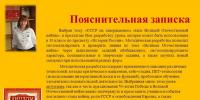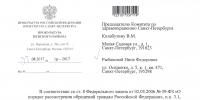High frequency English words. The most common words in English
If you think that 3000 words is too much, I recommend starting with - this is a short summary from the 3000 Dictionary for Beginners, the main ones have been selected from the main ones.
Why are there exactly 3000 words in the dictionary?
Linguists believe that the core vocabulary in English is approximately 2000 - 3000 words.
- The 1000 most common words cover 78-81% of written text.
- 3000 words – about 85% of the text.
- 6000-7000 words – 90% text.
It turns out that the first 3000 words in terms of frequency of use provide an understanding of 85% of the text, while the second 3000 words add only 5%. Each next thousand words adds much less than the previous one. This is because less common words (those not in the most common 3000) are rare. Therefore, it is believed that in order to quickly learn a language, it is most effective to learn the most common 2000-3000 words, and then add more lexicon, reading and listening to original materials: news, fiction, movies, radio, etc.
What counts as one word in English?
When talking about vocabulary, scientists understand by one word not a single word, but a word family - the central word (headword) plus its derivatives, which are formed using endings, prefixes and suffixes.
 It is enough to know the basics of grammar and patterns of word formation in order to make burner (burner) or burnable (combustible) from the word burn (burn). Dictionary 3000 contains 3000 central words. Knowing the peculiarities of word formation, you will understand not only these 3000 words, but also all their derivatives.
It is enough to know the basics of grammar and patterns of word formation in order to make burner (burner) or burnable (combustible) from the word burn (burn). Dictionary 3000 contains 3000 central words. Knowing the peculiarities of word formation, you will understand not only these 3000 words, but also all their derivatives.
Will I be fluent in English after learning these 3000 words?
Vocabulary is a very important, but not the only component of language proficiency. Knowing words by itself will only give you knowledge of words. To speak a language you need knowledge of basic grammar and practice in speech activity(it includes reading, listening, speaking and writing).
In my book I call this combination the language formula:
Language proficiency = (vocabulary + grammar) × practice in 4 types of speech activity.
Vocabulary 3000 is a concise way to lay the foundations of your vocabulary. He doesn't pretend to be more.
How I learned 3000 English words
I recently started a YouTube channel, and in the first video I talked about how I myself learned 3,000 English words when I first started learning English. I hope you find it interesting!
Typically, a frequency dictionary is understood as a list of words obtained by analyzing a set of texts and sorted by frequency of occurrence.
Our English frequency dictionaries contain not only ranked lists of words, but also frequency lists phrases, idioms, compound (phrasal) verbs and slang.
In addition, we have created frequency dictionaries of grammatical structures in the English language. This allows you to study both vocabulary and English grammar.
Our frequency dictionaries were obtained using the mathematical apparatus we developed and implemented on its basis software. The basis for the analysis was the subtitles of Hollywood films as a source of colloquial vocabulary and grammar of the English language.
To use Hollywood Vocabulary frequency dictionaries, you need to install a free program for studying them - Hollywood Vocabulary English tutorial.
All material from our library frequency dictionaries of the English language divided into topics, levels and stages.
Hollywood Vocabulary Frequency Dictionary Topics
Number of topics English dictionaries constantly replenished. Announcements of new dictionaries can be found in the site news.
Frequency Dictionary of English "Words"
Frequency dictionaries this topic are key. They contain lists of English words distributed according to frequency and examples of their use. Having studied (in total!) about 800 words from our frequency dictionary, you will be able to understand any English-speaking foreigner.
Frequency Dictionary of English "Phrases"
Frequency dictionaries this topic as well as topic dictionaries - Words are extremely important in the perception of living English speech. Apart from the fact that they demonstrate the principles of combining English words, they also represent larger units of speech. Knowing them, it is easier for us to understand the interlocutor, even who speaks very quickly and pronounces words poorly. After all, in our native speech, we only need to make out a few words to understand what they want from us.
English Frequency Dictionary "Compound (phrasal) verbs"
ABOUT frequency dictionaries On this topic, we can only say that, knowing separately the translation of verbs and prepositions of the English language, as a rule, it is difficult to guess the meaning of a compound English verb consisting of their combinations. For example, fly at is translated as - to attack, scold, and separately, fly means to fly, the preposition at usually indicates a location.
Frequency Dictionary of English "Idioms"
Frequency dictionaries This topic contains idioms - established expressions of the English language, sayings, sayings. They are often used in English colloquial speech and without knowing them, it is sometimes difficult to understand jokes, irony and humor in general.
Frequency Dictionary of English "Slang"
IN frequency dictionary This theme is reflected in the words and their combinations of subculture languages - street, criminal, musical and others, often used in films.
Frequency Dictionary of English "Suffixes and Prefixes"
Frequency dictionaries this topic is very significant. Their importance lies in the fact that they can expand our English vocabulary several times over. For example, knowing the English verb differ - to differ and several suffixes and prefixes, our vocabulary will be replenished with words such as different - different, difference - difference, differently - different, differing - different, in different - indifferent, in difference - indifference, in differently - it doesn’t matter and these are only the simplest options. In addition, without knowing an English word, but hearing its suffix, we get an idea of its part of speech, which also contributes to understanding.
Frequency Dictionary of English "Prepositions"
Frequency dictionaries of prepositions of the English language have special significance when you yourself want to say something. The fact is that English prepositions
Frequency dictionaries of verb constructions of the English language
IN frequency dictionaries this topic covers typical grammatical structures in English. Why are they important? The fact is that in English, unlike Russian, there are no cases, and the order of words in a sentence can play a decisive role for correct translation phrases. In addition, each construction has its own set of verbs with which it can be used, and incorrect use of a verb results in an error. Frequency frequencies we have developed dictionaries verbal constructions of the English language help to develop an intuitive sense of the appropriateness of using certain verbs in various types designs. Part dictionaries of verb constructions describe the type-temporal model of the English language. Our research has shown that more than 90% of all phrases are in Simple tenses, a third of types of tense constructions are not used by native English speakers at all, and another third are reduced to a few set expressions.
Dictionaries of English verb constructions are provided free of charge, subject to enrollment in Hollywood Vocabulary English language courses.
Levels and stages of Hollywood Vocabulary frequency dictionaries
Each topic can be divided into several levels of complexity, from the simplest - level zero, whose dictionaries cover about 55% of the content of films, to the most advanced - level five, dictionaries of this level cover about 95% of the content of films. In turn, each level is divided into stages. The zero level includes dictionaries of the zero stage, the first - dictionaries of the zero and first stages, the second - zero, first and second, etc.

Part frequency dictionaries the zero stage is free, and frequency dictionary of English phrases This stage comes with the Hollywood Vocabulary program. These dictionaries contain a small amount of very important material, sufficient for the first acquaintance with the English language, computer systems and educational technology.
We conducted experiments with subtitle texts, leaving a given percentage of words in them, and replacing the remaining words with masks.
The results of the experiment showed:
55% - Level 0 - meaning, almost incomprehensible;
65% - Level 1 - the meaning is vaguely clear and individual remarks can already be understood;
75% - Level 2 - the plot and general outline of the film are already clear, but there are still many gaps;
85% - Level 3 - the plot and ongoing actions are completely clear, but some of the lines remain unclear;
90% - Level 4 - everything is clear, except for small details;
95% - Level 5 - complete understanding, and mainly proper names are covered with masks.
In article 625 basic words for beginners to learn English.
The author of this list is Gabriel Wyner.
The list is compiled very competently, according to thematic groups. So that it is easy and not tiring for you to learn words.
The main idea of such a list is not to study similar words, in which up to 40% of words are forgotten. On the contrary, all the words are selected according to a specific topic: animals, food, weather, city, people, frequent verbs, etc. Only 625 words.
How to use
1. Be sure to check each word for pronunciation.
2. The same applies to the translation of words. It is better if you use a direct dictionary in English. For beginners, learning a language completely from scratch is somewhat problematic and time-consuming, but it’s true!
3. Use flashcards to memorize words if necessary.
4. Record yourself and your pronunciation on mp-4.
After learning your first 625 words, you will only be able to open your mouth a little and say something intelligible. But this is a great start for a beginner learning English.
Pronouns: Pronouns
I, you (singular), he, she, it,
we, you (plural, as in “y’all”), they.
Animal: Animals
dog, cat, fish, bird, cow, pig, mouse, horse, wing.
Transportation: Transport
train, plane, car, truck, bicycle, bus, boat, ship, tire, gasoline, engine, (train) ticket.
Location: Location
city, house, apartment, street/road, airport, train station,
bridge, hotel, restaurant, farm, court, school, office,
room, town, university, club, bar, park, camp, store/shop, theater,
library, hospital, church, market, country (USA, France, etc.),
building, ground, space (outer space), bank.
Clothes: Clothes
hat, dress, suit, skirt, shirt, T-shirt, pants, shoes, pocket, coat, stain.
Color: Colors
red, green, blue (light/dark), yellow, brown, pink, orange, black, white, gray.
People: People
son, daughter, mother, father, parent (= mother/father), baby,
man, woman, brother, sister*, family, grandfather, grandmother,
husband*, wife, boy, girl, child (= boy/girl),
king, queen, president, neighbor, adult (= man/woman), human (≠ animal),
friend (Add a friend’s name), victim, player, fan, crowd, person.
Job: Professions
Teacher, student, lawyer, doctor, patient, waiter, secretary, priest,
police, army, soldier, artist, author, manager, reporter, actor.
Society: Society
religion, heaven, hell, death, medicine, money, dollar, bill,
marriage, wedding*, team, race (ethnicity), sex (the act),
sex (gender), murder, prison, technology, energy, war, peace,
attack, election, magazine, newspaper, poison, gun, sport, race (sport),
exercise, ball, game, price, contract, drug, sign, science, God.
Art: Art
band, song, instrument (musical), music, movie.
Beverages: Drinks
coffee, tea, wine, beer, juice, water, milk.
Food: Food
egg, cheese, bread, soup, cake, chicken, pork, beef,
apple, banana, orange, lemon, corn, rice, oil, seed,
knife, spoon, fork, plate, cup,
breakfast, lunch, dinner, sugar, salt, bottle.
Home: Home
table, chair, bed, dream, window, door, bedroom, kitchen, bathroom,
pencil, pen, photograph, soap, book, page, key, paint, letter, note,
wall, paper, floor, ceiling, roof, pool, lock, telephone,
garden, yard, needle, bag, box, gift, card, ring, tool.
Electronics: Technology
clock, lamp, fan, cell phone, network, computer, program (computer),
laptop, screen, camera, television, radio.
Body: Body
head, neck, face, beard, hair, eye, mouth, lip,
nose, tooth, ear, tear (drop), tongue, back, toe,
finger, foot, hand, leg, arm, shoulder, heart, blood,
brain, knee, sweat, disease, bone, voice, skin.
Nature: Nature
sea, ocean, river, mountain, rain, snow, tree, sun, moon,
world, Earth, forest, sky, plant, wind, soil/earth,
flower, valley, root, lake, star, grass, leaf, air,
sand, beach, wave, fire, ice, island, hill, heat.
Materials: Substances and materials
glass, metal, plastic, wood, stone, diamond, clay, dust, gold, copper, silver.
Math/Measurements: Mathematical measurements
meter, centimeter, kilogram, inch, foot, pound, half,
circle, square, temperature, date, weight, edge, corner.
Misc Nouns: Miscellaneous nouns
map, dot, consonant, vowel, light, sound, yes, no, piece, pain,
injury, hole, image, pattern, noun, verb, adjective.
Directions: Directions
top, bottom, side, front, back, outside, inside, up, down,
left, right, straight, north, south, east, west.
Seasons: Seasons
Summer, Spring, Winter, Fall.
Months: Months
January, February, March, April, May, June, July,
August, September, October, November, December.
Days of the week: Days of the week
Monday, Tuesday, Wednesday, Thursday, Friday, Saturday, Sunday.
Numbers: Numbers
curved, male, female, tight, loose, high, low, soft, hard, deep,
shallow, clean, dirty, strong, weak, dead, alive, heavy,
light (heavy), dark, light (dark), nuclear, famous.
Verbs: Verbs
work, play, walk, run, drive, fly, swim, go, stop, follow,
think, speak/say, eat, drink, kill, die, smile, laugh, cry,
buy, pay, sell, shoot(a gun), learn, jump, smell, hear* (a sound),
listen* (music), taste, touch, see (a bird), watch (TV), kiss, burn,
melt, dig, explode, sit, stand, love, pass by, cut, fight, lie down,
dance, sleep, wake up, sing, count, marry, pray, win, lose,
mix/stir, bend, wash, cook, open, close, write, call, turn,
build, teach, grow, draw, feed, catch, throw, clean, find, fall,
push, pull, carry, break, wear, hang, shake, sign, beat, lift.
There is a misconception which reads something like this:
It is enough to know 500 English words in order to communicate freely with a native speaker on any topic.
This is wrong.
Look at the list and try to communicate freely in English with only 625 words to your credit. And you will understand that this is NOT real.
The maximum that is possible with such a set of words is to speak at the level of children's vocabulary.
At the moment I know about 3700 English words, which allows me to write letters to my American friends fluently. But this does not give me the opportunity to freely communicate with them on any topic. Knowing even these 3 thousand, I will not be able to say even the most basic things about jurisprudence, medicine, religion and other seemingly “free” topics.
After I decided to improve my level of English (mainly in terms of vocabulary), it almost immediately became obvious that the most effective method studying words - exclusively using frequency dictionaries. More precisely, the methods of studying and memorizing can be very different, but it is precisely the order and priority of certain words that should be determined based on frequency dictionaries.
Let's say you are reading a book in English, and every 10 words you come across one unknown thing. Imagine, at first I wrote down every unknown word and crammed them all every day. But very soon it became clear that the effectiveness of such study is close to zero - since most of these words appear only once or twice in the entire book, and in everyday vocabulary they can appear once a year.
This is where the frequency dictionary comes to the rescue. The idea is this: you come across a word whose translation you don’t know. First you remember: how often does it occur to you in general? If this word is in the category of “yes, I’ve heard it many times, but I don’t know how it’s translated,” confidently set it to study and repeat. If you rarely come across this word, or you can’t remember it at all, then it’s time to look into the frequency dictionary.
There is such a wonderful service Test Your Vocabulary, which allows you to use a small sample (several dozen words) by comparing your results with the available data statistical analysis, roughly determine your vocabulary. There are also various graphs of results, for example, this is the distribution of participants (non-English speaking) by vocabulary:
As you can see, the vocabulary level of most people is around 4500 words. The median of the distribution is around 7800 words (half of the people have less vocabulary, half have more).
According to other linguistic studies, a vocabulary of 6–7 thousand words guarantees the understanding of 85% of English speech. Thus, we can conclude that a 6,000-year-old dictionary may be a perfectly acceptable goal to begin with.
So, returning to our algorithm. After you have found a word completely unknown to you, immediately look for it in the frequency dictionary. If, for example, you set out to increase your vocabulary to at least 6,000 thousand words, and the word you are looking for is in the first 6 thousand, put it on repeat.
In fact, after studying the first 6000 in the emergency, your vocabulary will, of course, be larger, due to those words that you already know and which were not included in the studied interval of the emergency.
Well, now the question. Where can I get a frequency dictionary? In Google? No matter how it is.
As a rule, sites for learning English offer us only the first thousand words of emergency, and you will have to pay for a more extensive dictionary. Yes, the first search for a dictionary of at least 3000 words caused me a storm of indignation. But then I still managed to find a very extensive dictionary, which, however, could not be used to search for words: it was divided into many pages, and the text, by the way, was protected from copy-paste (helps, of course, only in the case of schoolchildren or housewives). Therefore, in order to work normally with the frequency dictionary, I (not without a certain amount of ingenuity) grabbed the code from the pages and combined the first 6000 words I needed into one table.
Enjoy it and long live free access to information.
Update: expanded the table to 16000 words. This dictionary should cover 98% of English phrases.
Note: some numbers are missing in the table - these are proper names, which simply do not make sense to translate.
Information from the sponsor
Primo4ki.com: electronics and gadgets at low prices, selling Chinese phones. Quality guaranteed by the store.



